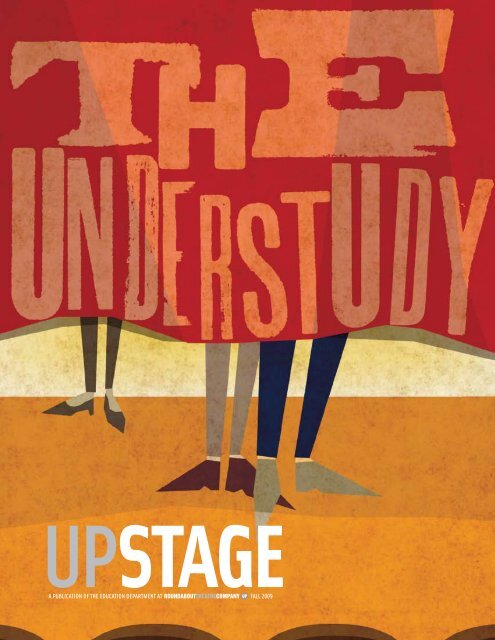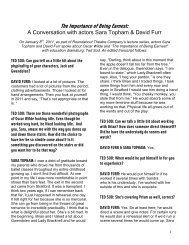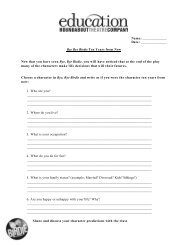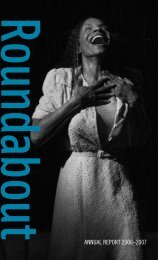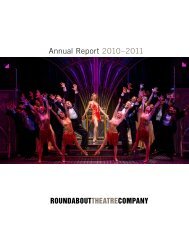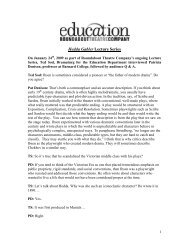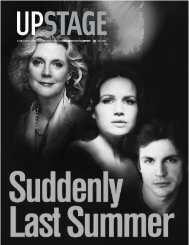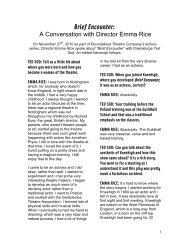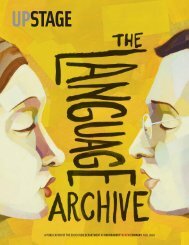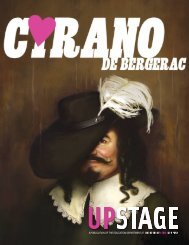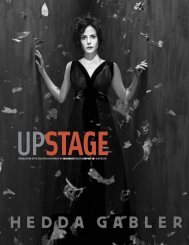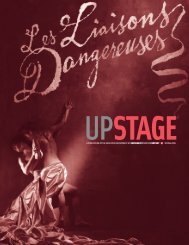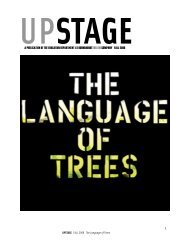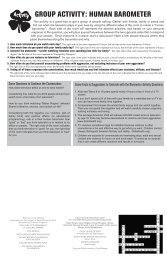The Understudy - Roundabout Theatre Company
The Understudy - Roundabout Theatre Company
The Understudy - Roundabout Theatre Company
You also want an ePaper? Increase the reach of your titles
YUMPU automatically turns print PDFs into web optimized ePapers that Google loves.
UPSTAGE<br />
A PUblicAtion of the edUcAtion dePArtment At <strong>Roundabout</strong>theatRe<strong>Company</strong> up fAll 2009<br />
UPSTAGE FALL 2009 <strong>The</strong> <strong>Understudy</strong> 1
2 <strong>Roundabout</strong>theatRe<strong>Company</strong><br />
How do the roles we play<br />
DEFINE us?<br />
“You have no rights!<br />
You are an actor!<br />
You’re not even an actor;<br />
you’re an understudy!”<br />
—RoxAnnE, ThE UndERSTUdy
4<br />
6<br />
8<br />
9<br />
Interview with the director:<br />
Scott Ellis 4<br />
Interview with the Actor:<br />
Julie White 6<br />
ThE WoRld of ThE PlAy:<br />
hierarchy of <strong>The</strong>atre 8<br />
famous Understudies 9<br />
franz Kafka 10<br />
Interview with the Playwright:<br />
<strong>The</strong>resa Rebeck 11<br />
Interview with the Set designer:<br />
Alexander dodge 13<br />
Vocabulary 15<br />
Activities 16<br />
Resources 16<br />
10<br />
11<br />
13<br />
15<br />
UPstAge contribUtors: greg mccaslin Education Director; Jennifer dibella Associate Education Director; Jay gerlach<br />
Education Associate for <strong>The</strong>atre Programs; Aliza Greenberg Education Program Associate; ted sod Education Dramaturg;<br />
Nicole Bournas-Ney, Mandy Menaker Education Interns; John Istel Contributor; LaTonya Borsay Contributor. coVer: Artwork<br />
for the <strong>Roundabout</strong> <strong>The</strong>atre <strong>Company</strong> production of THE UNDERSTUDY copyright © 2009 roundabout theatre company, inc.<br />
All rights reserved.<br />
<strong>Roundabout</strong>theatRe<strong>Company</strong> 231 West 39th Street, Suite 1200, New York, NY 10018 Telephone: 212.719.9393<br />
Fax: 212.869.8817 www.roundabouttheatre.org.
IntervIew wIth<br />
4 <strong>Roundabout</strong>theatRe<strong>Company</strong><br />
the DIrEctor : Scott Ellis<br />
UPSTAGE SAT doWn WITh ThE UndERSTUdy dIREcToR ScoTT EllIS, Who AlSo SERVES AS<br />
RoUndAboUT ThEATRE comPAny’S ASSocIATE ARTISTIc dIREcToR.<br />
Why did you want to direct <strong>The</strong> <strong>Understudy</strong>?<br />
I got the script from Williamstown. Nicky Martin, the<br />
artistic director there, said, “You should look at this.”<br />
So he sent it and I really liked it. And I said, “Ok.” I had<br />
never read one of <strong>The</strong>resa Rebeck’s plays before. It was<br />
as simple as that.<br />
did you direct readings of the play at <strong>Roundabout</strong><br />
first?<br />
Yes. I said to <strong>The</strong>resa, who had heard it once, that I’d<br />
like to hear it, so we did a small reading just for her and<br />
the three actors. She worked on it, and then I said, “Let’s<br />
do it at the <strong>Roundabout</strong> in the subscriber program in<br />
front of a larger audience,” and that went well. <strong>The</strong>n we<br />
brought it to Williamstown. My intent was always to<br />
bring it back to the <strong>Roundabout</strong>.<br />
you’ve been working in both worlds, theatre and<br />
television, and there seems to be something in<br />
the play about the hierarchy of actors in different<br />
mediums. did that appeal to you?<br />
I am going to have to say no. <strong>The</strong> only appeal was that it<br />
was a good play and I liked it. It made me laugh, and it<br />
made me care about the people. To me that was it.<br />
Tell me about casting. you had a whole other cast<br />
at Williamstown.<br />
It’s unusual that I’ll be doing a play with a whole<br />
different cast—I’ve never done that before. Julie White<br />
did the reading originally. She was cast in it and then<br />
couldn’t do it in Williamstown. But I always knew that<br />
if I did it in New York, I would go back to her to do it.<br />
So I always had her in mind anyway. <strong>The</strong> other two roles<br />
were cast up in Williamstown, and they’ve been recast<br />
here. Bradley Cooper had a film, and Reg Rogers chose<br />
to do another play. But I am beyond thrilled with the<br />
cast that we have.<br />
Justin Kirk, who is playing harry, is a TV star now;<br />
he is a very interesting choice and I think he’s just<br />
got that right dry quality.<br />
And Mark-Paul Gosselaar was Zack on Saved By the<br />
Bell, but he’s never done theater. He auditioned for me<br />
and he was great. He had a great audition, and I figured,<br />
let’s try this.<br />
What this play made me realize when I read it is<br />
that we are asked to play certain roles in life. not<br />
just in our business lives, but all the time. And I’m<br />
really fascinated by the aborted romance between<br />
harry and Roxanne. do you find that an interesting<br />
part of the script?<br />
People try to put other people in certain categories.<br />
You walk in and you are cast, you are typed. I’m typed,<br />
you’re typed, it doesn’t matter. We are all typed the<br />
minute we walk in a room. That can change once they<br />
get to know you or they see something else, but we are<br />
attracted to people because they are a type. We hire<br />
people because they are a type. That’s just how human<br />
nature works. Harry comes in and thinks Jake is just this<br />
stupid action star. Jake thinks Harry is a non-talented<br />
actor who is an understudy. Harry now sees his ex,<br />
Roxanne, as a stage manager who was an actress. <strong>The</strong>re<br />
are these constantly shifting feelings as far as what you<br />
are expecting from each individual.<br />
do you have any idea what the Kafka play within<br />
the play is about?<br />
I had <strong>The</strong>resa write a little bit of what it was about so<br />
the actors could follow the play and know what was<br />
going on. But the audience is not there to care about the<br />
Kafka play; you don’t need to follow that through.<br />
Roxanne and harry were together as a couple, then<br />
he left her and now they are together again as if<br />
by fate. That relationship could be seen as sort of<br />
Kafkaesque—would you agree?<br />
Yes, there’s a way that Kafka dealt with women, and<br />
that’s how Harry deals with women. <strong>The</strong>re was a<br />
commitment, and then he left. Kafka basically did the<br />
same thing.<br />
When front & center, our subscriber magazine,<br />
talked to <strong>The</strong>resa Rebeck, the author, she said<br />
that she felt that this was one of her most tenderhearted<br />
plays. do you see that?<br />
Yeah, totally. It’s about love, it’s about the love of theater,<br />
it’s what people do for the art, how much passion they<br />
have for it, why we all do it. In fact, at the end, they<br />
continue to rehearse, and that speaks volumes. We<br />
don’t do it for the money. <strong>The</strong> one person who does<br />
do it for the money is Bruce, who gives is all up to go<br />
do a big action movie for a lot of money, and the other<br />
characters aren’t like that. <strong>The</strong>y are passionate about the<br />
work.<br />
Tell me something about the sets. <strong>The</strong>y feel like<br />
another character to me.<br />
Actually, the character who represents the sets is Laura.<br />
She is a character we never see. <strong>The</strong> way we see that
character behave is through the movement of the sets.<br />
<strong>The</strong> sets are important because there is something going<br />
on constantly with lighting, sound and the settings that<br />
make the off stage character of Laura important.<br />
how did you collaborate with Alexander dodge,<br />
the set designer? had you ever worked with him<br />
before?<br />
No, I had not worked with him before. Nicky Martin<br />
had suggested him. It was a good collaboration—it<br />
was a great collaboration. It took us a little bit to get<br />
it. In Williamstown we had the challenge of doing it<br />
on a smaller stage and how to make that work. And, in<br />
fact, it helped us here because we’re on a small stage in<br />
New York too. <strong>The</strong> challenge was finding how to get to<br />
these constantly changing sets to work. You couldn’t<br />
see anyone on stage moving them of course. <strong>The</strong>y had<br />
to be magically moving because it’s all supposed to be<br />
happening immediately.<br />
Tell me about the designers for lighting and<br />
costumes.<br />
Kenny Posner, who I’ve worked with before and Tom<br />
Broecker, who also did costumes for Streamers, is<br />
designing the clothes—he’s great. I met him through 30<br />
Rock. He does costume design for 30 Rock.<br />
you’ve directed for 30 Rock, Weeds, and nurse<br />
Jackie. do you still love the theater as much as you<br />
used to?<br />
Oh, absolutely. I love it. My thing is—I don’t do<br />
television unless I know I’m doing theater. I’ve never<br />
said yes to a TV show unless I knew I had a theater job<br />
coming up.<br />
but don’t you feel there are similarities? do you<br />
feel like you are rehearsing a one act when you are<br />
doing a TV show?<br />
Yes, there are similarities. Listen, you are telling a story.<br />
You tell it in a different way, and you have to tell it in a<br />
very fast way in television. That’s hugely different. <strong>The</strong>n<br />
you are telling the audience where to look through the<br />
use of a camera lens whereas in theater you are doing it<br />
in a lot of different ways. I think the biggest thing is that<br />
it’s just very fast in television. You still have to ask the<br />
same questions.<br />
you don’t see a difference in the actors, do you?<br />
harry has a prejudice against Jake and bruce,<br />
but that’s more out of professional jealousy than<br />
reality, right?<br />
I’m fortunate that most of the actors I’ve worked with<br />
on television shows—Nurse Jackie, Weeds—come from<br />
theater. I think people who don’t come from theater<br />
can get wrapped up in this Hollywood stuff, and it’s not<br />
about the work –it’s about something else. I’ve definitely<br />
run into that, but for the most part I’ve been lucky<br />
that the actors I’ve worked with on TV have been good<br />
actors, and they’ve been theater-based.<br />
I wanted to end with talking a little bit about how<br />
you are going to prepare for this. you’ve done it<br />
before. do you have to do anymore work after<br />
that?<br />
First of all, it’s three new actors, so my challenge is to<br />
wipe the other production out of my head. That’s really<br />
what I’ve got to do. <strong>The</strong> design is the same. We up scaled<br />
it a little bit and made it better, but the structure of<br />
the piece we kept because it worked. Blocking, actors,<br />
relationships -- that’s all going to be different because<br />
we have three new actors. So that for me really is the<br />
challenge -- to let it be what it’s going to be with these<br />
three people and not bring my preconceived ideas from<br />
the other production to the table. It’s a different ball<br />
game. up<br />
UPSTAGE FALL 2009 <strong>The</strong> <strong>Understudy</strong> 5
the Actor : IntervIew wIth<br />
Julie White<br />
6 <strong>Roundabout</strong>theatRe<strong>Company</strong><br />
UPSTAGE REcEnTly SPoKE WITh Tony AWARd-WInnInG AcTRESS JUlIE WhITE AboUT hER RolE<br />
In ThE UndERSTUdy, RoxAnnE, ThE STAGE mAnAGER.<br />
What made you decide to become an actress?<br />
I’ve told this story before. I was late for my English class<br />
so many times that I had built up like three hours of<br />
detention, and I came after school to do my three hours<br />
with the English teacher. He was also the head of the<br />
drama department, and he was having auditions for<br />
Guys & Dolls. So I sat there and watched all these other<br />
kids audition—specifically for Miss Adelaide—and I<br />
was like, “Wait a minute. I could do that. I could do that<br />
way better then any of them.” So I asked him if I could<br />
audition, if he would cut my three hours down to two if<br />
I agreed to potentially humiliate myself. He said yes. So I<br />
auditioned and I got it.<br />
have you been singing since?<br />
I sang a little in my first show. <strong>The</strong> show that actually<br />
brought me here was <strong>The</strong> Baker’s Wife by Stephen<br />
Schwartz and Joseph Stein. My first show when I came<br />
to New York was the musical Lucky Stiff.<br />
you strike me as someone who can see the humor<br />
in the roles you play, who has real gifts as a<br />
comedienne. Is that something you were born<br />
with?<br />
I can’t tell if it is nature versus nurture or something.<br />
But definitely my response to hardship is generally to<br />
see the funniness in it. To see what’s amusing. And I love<br />
to laugh.<br />
Was the part of Roxanne, the stage manager,<br />
written for you?<br />
I couldn’t say for sure, but I know that is was written<br />
with me in mind.<br />
I think it’s an ideal role for you.<br />
I like doing <strong>The</strong>resa Rebeck’s stuff. I think I just get the<br />
humor in it and the resilience of the characters that she<br />
writes for me to play.<br />
you were in her play bad dates, right?<br />
Yes.<br />
And you were in Spike heels too?<br />
I was.<br />
So, you’ve done quite a bit of Rebeck?<br />
Yes. I also did a play called <strong>The</strong> Family of Mann.<br />
Tell me a little bit about what it’s like to do a play<br />
by a female writer, and Rebeck in particular.<br />
What’s it like to act in a play by a woman? I’ve done a<br />
lot of that. Mainly, of course, because what I’m drawn to<br />
doing in a play is a great character. Of course, a woman<br />
could write a play about anything, but very often in a<br />
play written by a woman there are female protagonists<br />
or the central story is also about a woman. So those are<br />
the good parts to play. I certainly don’t confine myself<br />
to it.<br />
do you find that a woman’s perspective is different<br />
from a man’s? or is that too reductive?<br />
Each individual playwright’s perspective is different,<br />
whether it be that of a man or a woman. <strong>The</strong>y are<br />
coming from their own individual set of what their<br />
belief systems are, what is important to them. For<br />
example, Liz Flahive, she’s a wonderful young writer<br />
whose play, From Up Here, I just did last year at<br />
Manhattan <strong>The</strong>ater Club. She was writing about young<br />
people, and I played the parent of a troubled teen. She<br />
was writing about her recent past. She was only like<br />
24 or 25 when she started working on the play. On the<br />
other hand, sometimes you do a play by someone later<br />
in their life, like when I did Donald Margulies’ play<br />
Dinner with Friends; he was sort of at a mid-life place<br />
and sort of wrote about that perspective—about people<br />
who were in their late 30s and 40s. It is where you catch<br />
them in their development. Playwrights are people too,<br />
so they write about what’s happening in their lives or<br />
what interests them in their lives.<br />
Tell me a little bit about the part of Roxanne. I<br />
know you haven’t started rehearsals, but do you<br />
have any impressions of who she is at this point?<br />
Well, not more than is actually indicated in the writing.<br />
What <strong>The</strong>resa mainly does is give me these great<br />
obstacles. Roxanne has a huge obstacle from the very<br />
get-go of the play, from the minute she sees Harry. I’m<br />
under such duress in this play. It’ll be really interesting<br />
to work on it, to see how we work through it, because I<br />
feel like there’s a change in Roxanne by the end of the<br />
piece.<br />
do you think that change is precipitated by<br />
interacting with the character of harry?<br />
A little bit. Yes, by getting to see him after all these years,<br />
never seeing him or having spoken to him after he did<br />
that dreadful thing.<br />
What is the first thing you did when you got the<br />
script? Read it and then…?<br />
This play I’ve had for a couple of years. I’ve been<br />
reading drafts of this play for a while now. I’ve been sort<br />
of living with it and thinking about it. I’m about four<br />
weeks out from rehearsal now, and what I will probably
do is just take it with me—I’m going out of town for<br />
a little bit—and try and read it in the morning and<br />
read it before I go to bed. I’ll actually start learning it.<br />
I started doing that with Bad Dates, because how can<br />
you start rehearsing a play if you are holding a script in<br />
your hand? I don’t know how to work on a play until<br />
I know it. So I’ll learn a lot of if before we start. Or I’ll<br />
have it down pretty well in my head. Not letter perfect. I<br />
find that it’s the old Spencer Tracy thing—“Learn your<br />
lines and don’t bump into the furniture.” Step one is<br />
definitely to learn the lines because how can you work<br />
it until you know what you are saying? <strong>The</strong>n you can<br />
really deeply learn what you are saying as you rehearse<br />
it.<br />
Tell me a little bit about research. Will you talk to a<br />
lot of stage managers?<br />
No. I know so many stage mangers so well. <strong>The</strong>y are<br />
just great people in general. I mean Roxanne was an<br />
actress at one point who gave that up because it was<br />
just too insane. I think she wasn’t willing to deal with<br />
the craziness of waiting for the call every day and would<br />
rather have a more hands-on job behind the scenes.<br />
What do you think the play is about?<br />
I think a key to the show has always been Laura, the<br />
unseen character in the booth.<br />
you mean the stoner technician, right?<br />
Yes. And no matter what I ask for she doesn’t give<br />
me what I ask for. Like I’ll ask for the bar scene, and<br />
she’ll bring in the interrogation room. So we just end<br />
up doing that instead. In some ways I think she is<br />
representative of God. I think that you ask God for what<br />
you think you need, and you don’t get it. And I think<br />
there’s something like that with Laura. Is God just a big<br />
stoner and everything is random? Or is there method to<br />
that madness? Is there an intelligence to that order, or<br />
is it just random? I think that’s the great question of the<br />
play—how does one deal with that crazy stoner, God?<br />
Maybe at the end of the day you just got to do a dance.<br />
What about the play within the play—the whole<br />
Kafka thing. do you have any idea what the play<br />
within the play is about?<br />
You mean the actual story of that play?<br />
yes. <strong>The</strong> play harry, Roxanne and Jake are<br />
rehearsing is a “lost” play of Kafka’s. It feels like<br />
sometimes the play we are watching is mirroring<br />
some Kafkaesque world. do you agree?<br />
Completely. It’s incredibly clever how <strong>The</strong>resa’s weaving<br />
that in and out. And by making the undiscovered piece<br />
be by Kafka, she’s giving you themes through the play.<br />
She is telling you what we’re dealing with; it’s kind of<br />
absurd existentialism. What they always identify with<br />
Kafka is whether he believed there was a God or not.<br />
This play also deals with the hierarchy of actors. I<br />
know you probably know a lot about this because<br />
you’ve done television, movies and plays. do you<br />
think there is a kind of snobbery about theater<br />
actors versus film actors?<br />
Well, sure. <strong>The</strong> world of show business is a very<br />
complicated hierarchical lunch room. Who gets to sit<br />
at the fancy table; and who gets to be student body<br />
president; and who are the drama nerds at the drama<br />
table. I think the theater actors are probably still<br />
perceived as the drama nerds. <strong>The</strong> ridiculousness, the<br />
absurdity of the hierarchy, is what <strong>The</strong>resa is dealing<br />
with in the play, along with the hierarchy in Kafka. He’s<br />
always looking at office politics. And in some ways it’s<br />
about Harry and where he fits in. You know how in<br />
Metamorphosis Kafka famously had that guy wake up as<br />
a giant cockroach.<br />
What do you look for in a director?<br />
I’ve worked with Scott Ellis on Little Dog Laughed. He<br />
directed it off-Broadway, on Broadway and then again<br />
in Los Angeles. I love working with him because I know<br />
Scott so well. I really trust him. You are letting the<br />
director be your eyes and ears, telling you how to tell the<br />
story the way you want to tell it. So you really have to<br />
trust him. I trust Scott a lot—I trust him to have good<br />
taste; I trust him to have a sense of humor. I look for<br />
directors whose judgment I trust. (click here to see a clip<br />
of Julie White’s performance in Little Dog Laughed)<br />
can we talk a little bit about what advice you<br />
might give to a young person who says they want<br />
to be an actor?<br />
Don’t do it! You have to be very brave because most<br />
of the time you are going to hear something that is a<br />
variation on the word “no.” “No, you didn’t get it. No,<br />
you’re not right for it. No, you can’t get an audition for<br />
it.” So you have to really, really, really want to do it. And<br />
really believe in yourself. up<br />
UPSTAGE FALL 2009 <strong>The</strong> <strong>Understudy</strong> 7
8 <strong>Roundabout</strong>theatRe<strong>Company</strong><br />
ThE hIERARchy of ThEATRE<br />
World of the<br />
ThE ThEATRE fAmIly TREE: bREAKInG doWn ThE hIERARchy<br />
ThE PRodUcER finances or helps find money for the entire project and is<br />
ultimately in charge of presentation and advertising. This affords him/her the<br />
largest share of control over the production.<br />
ThE dIREcToR creates an overall vision for the production, casts the show and<br />
is responsible for the performances of the actors and everything else that happens<br />
on stage, including blocking and movement of props.<br />
ThE STAGE mAnAGER makes<br />
sure rehearsals run smoothly<br />
and that every member of<br />
the production team is aware<br />
of what the others are up to.<br />
However, this job has no artistic<br />
input or control. Once the<br />
show opens, the stage manager<br />
becomes the stand-in for the<br />
director and is in charge of<br />
everything that needs to happen<br />
backstage and on stage each<br />
night, from half-hour call to<br />
final bows.<br />
ThE ASSISTAnT STAGE<br />
mAnAGER/boARd<br />
oPERAToRS/STAGE cREW<br />
<strong>The</strong>se people answer to<br />
the stage manager and are<br />
responsible for making sure that<br />
sounds, lights, props, and sets<br />
run as planned during every<br />
performance.<br />
dESIGnERS Each member of<br />
the design team creates one of<br />
these four production elements:<br />
sets, lighting, costumes, and<br />
sound effects.<br />
cASTInG dIREcToR assists<br />
the director in deciding which<br />
actors might be appropriate for<br />
each role in the production, and<br />
helps run the entire audition<br />
process.<br />
ThE STAR plays the leading role in the show<br />
and is often a celebrity or movie star. He/She<br />
has a certain amount of influence and control<br />
because so much of the show’s potential financial<br />
(and sometimes artistic) success is riding on this<br />
person.<br />
ThE fEATUREd AcToRS <strong>The</strong>se performers have<br />
less artistic say than the stars, but they still have<br />
substantial individual roles.<br />
ThE EnSEmblE This group fills out the<br />
background of a play. <strong>The</strong>y make less money than<br />
leading and featured actors, don’t get to have their<br />
own dressing rooms like the other performers, and<br />
tend to have very little creative input.<br />
ThE UndERSTUdy is expected to learn whatever<br />
role he/she is asked to cover and be ready to play<br />
the role if the need arises, although it usually<br />
never does. Understudies are expected to recreate<br />
the performance of the actor who they are<br />
replacing rather than make any artistic decisions<br />
about roles themselves.
PlAy<br />
fAmoUS UndERSTUdIES<br />
Although <strong>The</strong> <strong>Understudy</strong>’s Harry never gets his shot at the spotlight, many Broadway understudies have gotten the<br />
opportunity to make it to the top. Some have gone on when the star couldn’t and became hits in their new roles.<br />
Others have gone on to become successful leading actors in their own right years later. And while today all these<br />
actors can call themselves movie stars or Broadway leads, they all started as understudies.<br />
In 1954’s <strong>The</strong> Pajama Game, star Carol Haney was injured during the run of the show, and<br />
at a moment’s notice, her vivacious, redheaded understudy had to take her place. That young<br />
understudy, an actress named Shirley MacLaine, stepped in and not only became a sensation<br />
in the role, but more significantly, also attracted the notice of a Hollywood producer, who<br />
just happened to be in the crowd that night. This led to movie stardom and later to an<br />
Academy Award for her performance in Terms of Endearment.<br />
At the 2001 Tony Awards, an actor who started off the season<br />
as an understudy ended it as a Tony nominee. That actor was<br />
Brad Oscar, who had begun as the understudy for the role of<br />
Franz Liebkind in <strong>The</strong> Producers and who had been called in<br />
(and eventually taken over the part) when the original actor,<br />
Ron Orbach, was injured. A year later, at the 2002 Tonys, it was<br />
Sutton Foster’s turn. She had gone on as Thoroughly Modern<br />
Millie’s title character at the last second at an out of town<br />
performance and was later given the role full time on Broadway.<br />
Foster not only went from understudy to Tony nominee—she<br />
actually made it onto the stage of Radio City Music Hall,<br />
winning the best actress statuette.<br />
And although she is of course fictional, 42nd Street’s plucky Peggy<br />
Sawyer is perhaps the archetypal understudy—the one who takes over the lead at the last<br />
possible minute and becomes an unbridled success. Somewhere, in the back of their minds,<br />
every understudy remembers the famous quote: “Sawyer, you’re going out a youngster, but<br />
you’ve got to come back a star!”<br />
UPSTAGE FALL 2009 <strong>The</strong> <strong>Understudy</strong> 9
10 <strong>Roundabout</strong>theatRe<strong>Company</strong><br />
“ WhEn GREGoR SAmSA AWoKE onE moRnInG fRom TRoUblEd dREAmS, hE foUnd hImSElf<br />
chAnGEd InTo A monSTRoUS cocKRoAch…”<br />
—Franz Kafka, Metamorphosis<br />
fRAnz KAfKA<br />
<strong>Understudy</strong> playwright <strong>The</strong>resa Rebeck uses the stories and novels of German writer Franz Kafka as inspiration for<br />
her play and the fictional play-within-a-play. Kafka, whose family was of German heritage, was born in Prague in<br />
1883 and went on to write a series of classic novels and short stories including <strong>The</strong> Trial, the tale of an innocent<br />
man accused of an unknown crime; <strong>The</strong> Castle, a dreamlike work about a man trying to gain access to a mysterious<br />
organization; and Metamorphosis, the story of a man suddenly turned into a giant cockroach.<br />
Kafka and his three sisters grew up with an intensely overbearing father who, it is widely agreed, was responsible<br />
for many of the feelings of intense guilt and self-loathing that play so big a part in Kafka’s work. As one critic wrote,<br />
for Kafka and his sisters, life with their father was “a trial in which they were inescapably guilty.” Very few of Kafka’s<br />
works were published during his lifetime and, when Kafka knew he was dying of tuberculosis, he asked his best<br />
friend, Max Brod, to burn all of his writing once he died. However, when Kafka passed away in 1924, Brod didn’t<br />
destroy the manuscripts and instead readied them for publication, feeling that deep down that was what Kafka<br />
actually wanted.<br />
Kafka’s unique works of fiction take place in worlds that are irrational, nightmarishly bureaucratic, and darkly<br />
ludicrous, in many ways similar to the bizarre, uncontrollable situation Harry, Jake and Roxanne find themselves<br />
in during <strong>The</strong> <strong>Understudy</strong>. Perhaps the most succinct summary of Kafka’s worldview came from the author himself<br />
when he said, “In the fight between you and the world – back the world.”<br />
(Click here to watch a clip of Franz Kafka’s <strong>The</strong> Trial)
IntervIew wIth<br />
the PlAyWrIGHt :<br />
<strong>The</strong>resa Rebeck<br />
UPSTAGE dIScUSSEd ThE UndERSTUdy WITh PlAyWRIGhT ThERESA REbEcK<br />
you’ve had plays produced all over new york city,<br />
but this is your first at <strong>Roundabout</strong>. how did that<br />
happen?<br />
I’ve always admired Todd Haimes and what he does<br />
with <strong>Roundabout</strong> and I was very fortunate that<br />
Nicky Martin asked me to bring <strong>The</strong> <strong>Understudy</strong> to<br />
Williamstown, where he is artistic director. He’d already<br />
sent it to director Scott Ellis at <strong>Roundabout</strong>, who liked<br />
it very much and was interested in working on it.<br />
<strong>The</strong>n there’s this Monday night play reading series for<br />
<strong>Roundabout</strong> subscribers, and Scott asked if I’d like to<br />
do that. I thought it was a terrific opportunity to see it<br />
in front of an audience and hear what we had. That gave<br />
me a chance to work on the script for a month before<br />
we began rehearsals in Massachusetts. Todd came up<br />
to Williamstown and loved it. <strong>The</strong>n it was really easy<br />
for us to commit to each other in a very protected way.<br />
Actually, it’s never easy. But it felt easy.<br />
do you feel <strong>The</strong> <strong>Understudy</strong> is very different from<br />
your previous work?<br />
It feels different to me in that it’s a tenderhearted play<br />
and I don’t achieve that always. I do feel that the play<br />
is about disappointment and joy—and there is a lot<br />
of love in it that made me feel safe enough to float<br />
around in some of those issues. This play is very much<br />
about love—love of art, about people whose lives are<br />
defined by their passion for storytelling. <strong>The</strong> character<br />
of Jake, the movie actor, has so much love for Kafka.<br />
<strong>The</strong>re’s a real delight and passion for this odd German<br />
expressionist and the play starts to partake of that<br />
joy and revels in the oddness of art. <strong>The</strong> play is very<br />
affectionate toward all three characters.<br />
you seem to do a lot research after you choose<br />
a subject. Kafka plays a part in the plot of <strong>The</strong><br />
<strong>Understudy</strong>. how did you get into Kafka?<br />
I re-read a lot of his work. In college I just loved his<br />
stuff, the eccentricity of it. <strong>The</strong>n there was a point about<br />
four or five years ago when my husband and I were<br />
going to Prague, which is like “Kafka Central,” so I read<br />
a big biography and fell in love with his story all over<br />
again. <strong>The</strong> <strong>Understudy</strong> is about someone’s affection<br />
for that crazy guy more than it is about that crazy guy.<br />
<strong>The</strong>re’s a kind of terror and weariness in Kafka that the<br />
play partakes of but in a much more affectionate tone.<br />
A common theme in much of your work is a<br />
concern about the rights and respect artists deserve<br />
but rarely attain in our society.<br />
I worry about the place of the artist in our culture.<br />
If you were to ask me, I’d say capitalism and art<br />
don’t always mix; the interface of business and art is<br />
problematic. I’m a very passionate supporter of the<br />
theatre. I’m actually one of those people who say, “<strong>The</strong><br />
world would be a better place if people went to the<br />
theatre more often.” It’s an absurd thing to say, but<br />
theatre can be a moving experience to people on the<br />
best levels: it brings a community together; people are<br />
called into empathy; and they’re asked to have some<br />
kind of spiritual or psychological response to this<br />
communal event. I’m yearning for the theatre to bring<br />
more people in. I feel my stuff gets too categorized<br />
as commercial in a way that’s sort of dismissive. In<br />
fact you’ve got to invite audiences in. If they’re not<br />
coming we’re all in trouble. I do not think there’s a very<br />
coherent discussion about art and class in America.<br />
<strong>The</strong>atre’s a populist form at its core but there’s a notion<br />
that it’s an elitist form. I don’t think it is.<br />
What inspired this play?<br />
It kind of spun out of Harry’s, who is the understudy,<br />
character. I was writing a monologue for a friend, an<br />
actor who was in a bitter rage about his own inability<br />
to have a coherent life. So I was kind of writing<br />
this monologue and it started going in these crazy<br />
directions. I am interested in actors. I find them funny<br />
and frightening and heartbreaking because show<br />
business—theatre, film, television—is very hard on<br />
the spirit. I’ve spent a lot of time talking to people<br />
about how you survive this business and be healthy.<br />
Not everybody does. So I’m well acquainted with the<br />
bitterness of certain members of our community and<br />
the buoyancy of others. No one has it as bad as actors<br />
do. <strong>The</strong>y have to audition all the time and take direct<br />
rejection. <strong>The</strong>n we still expect them to embody the<br />
human spirit in all its different dimensions—and on a<br />
dime. It’s very hard on the heart. Also, actors can begin<br />
to feel like life is far too defined—and this is where<br />
I’ve worked to keep the play on its Kafka track—by<br />
enormous, mysterious forces that are way beyond their<br />
control. Certainly it feels like that being a theatre artist.<br />
UPSTAGE FALL 2009 <strong>The</strong> <strong>Understudy</strong> 11
12 <strong>Roundabout</strong>theatRe<strong>Company</strong><br />
<strong>The</strong>re’s that Kafka level of absurdity in your day-today<br />
living.<br />
Is that why you keep “bruce,” the unseen megamoviestar<br />
who Jake understudies, offstage?<br />
Yes, it heightens the sense that there are unseen forces<br />
offstage whose actions will affect these actors’ lives very<br />
directly. You just don’t know what they’re doing out<br />
there.<br />
So you always loved Kafka and you wrote a<br />
monologue about a bitter understudy and then<br />
what happened?<br />
<strong>The</strong>re are a lot of things crawling around my brain<br />
and I let them all crawl around and when one of them<br />
reaches a point where it becomes very insistent, then I<br />
write it. Edward Albee says he thinks about something<br />
for years, and then he writes it. I’m more in that school.<br />
I had been thinking about this play for a long time. I<br />
had written this little monologue and I thought there<br />
is something there. It also revolved around that joke<br />
Harry tells, “Get in the truck.” Sometimes, I don’t<br />
think jokes are trivial events. I see jokes as very serious<br />
statements. <strong>The</strong>re are, in fact, screenwriters out there<br />
being paid millions of dollars to write “Get in the truck.”<br />
That is something that irks me on a deep psychological<br />
level. So I had written this rambling monologue about<br />
that and at the end I suddenly realized this guy was<br />
understudying. Once I had that nugget, I thought, “You<br />
should write a play.” <strong>The</strong>n I was walking down the street<br />
with a neighbor and I started saying I think I’m going<br />
to write this play about an understudy and he’s going to<br />
be working on a Kafka play and it all just sort of erupted<br />
from me.<br />
<strong>The</strong>re’s also the issue of film acting vs. stage<br />
acting in the play. harry, who’s supposed to be the<br />
experienced, classically trained stage actor, can’t<br />
always do things Jake, the hollywood hunk, can.<br />
It’s just that Harry doesn’t know how to handle a gun<br />
well. With some actors, they’ll come into an audition<br />
and you can just see they wear their body in a different<br />
way. Harry, though he’s a wonderful actor, is someone<br />
who wears his body like failure in a way that Jake<br />
doesn’t. I found this working in Los Angeles with all<br />
those actors. Most of those guys are really buff. <strong>The</strong>y<br />
work out at the gym a lot and I’m sure they practice<br />
with guns. <strong>The</strong>y go to shooting ranges and learn how to<br />
use guns, pocket them right. That kind of confidence is<br />
something that Harry doesn’t have.<br />
now that <strong>The</strong> <strong>Understudy</strong> has been produced once<br />
at Williamstown, do you feel it’s finished? or like<br />
Tennessee Williams, do you never stop tinkering<br />
with your plays?<br />
I do a lot of rewriting. Edward Albee says “I never<br />
rewrite,” and he’s so proud of it. I could never do that. I<br />
rewrite all the time.<br />
<strong>The</strong> writer who introduces the volume of<br />
your published plays says they always ask<br />
big questions. What’s the big question of <strong>The</strong><br />
<strong>Understudy</strong>?<br />
Can art survive culture? Pretty good, right? up
IntervIew wIth<br />
the set DESIGNEr :<br />
Alexander Dodge<br />
UPSTAGE REcEnTly InTERVIEWEd SET dESIGnER AlExAndER dodGE AboUT cREATInG ThE WoRld<br />
of ThE UndERSTUdy.<br />
What made you want to design settings for the<br />
theatre as your profession?<br />
I was born in the Swiss Alps to an American father and<br />
a German mother. When I was 6, we moved back to<br />
the states and I was up at Taliesin West in Arizona. My<br />
father is an architect who studied with Frank Lloyd<br />
Wright and still teaches at Taliesin. I wanted to be an<br />
architect myself throughout my childhood. However, at<br />
some point I became interested in theatre and figured<br />
set design was a good combination of architecture and<br />
drama. I was able to have my cake and eat it too, so to<br />
speak.<br />
Who are you influenced or inspired by as a<br />
designer?<br />
I am influenced by anyone and everyone. I get very<br />
excited by some contemporary architects, especially<br />
the work of Zaha Hadid, Santiago Calatrava, and<br />
Frank Gehry. I am always interested in how volume<br />
and the experience of spaces affect one’s perception<br />
and emotions. What do you feel when you walk into a<br />
certain, room, space, city street, public square? Good set<br />
design can do that as well and bring a performance to<br />
another level. I am fascinated by the body within a three<br />
dimensional volume.<br />
What kind of research did you have to do to design<br />
<strong>The</strong> <strong>Understudy</strong>?<br />
I started with looking at early 20th century photographs<br />
of Prague. <strong>The</strong> black and white images all had the dark<br />
brooding quality of the Kafka’s play-within-the-play. I<br />
also looked at many of M.C. Escher’s optical illusions.<br />
His work was very influential in the final stage picture<br />
of the play.<br />
What was most challenging about designing this<br />
show?<br />
<strong>The</strong> scenery is essentially the fourth character in<br />
the play. Not to mention a character with a distinct<br />
personality. I knew identifying the right combination<br />
of “Broadway” and “Kafkaesque” would reveal what the<br />
design would ultimately need to look like. <strong>The</strong> scenery<br />
required some gritty reality but also needed some<br />
sense of surrealism. <strong>The</strong>refore the mechanics of the<br />
transformations from scene to scene took on particular<br />
significance.<br />
What do you think <strong>The</strong> <strong>Understudy</strong> is about?<br />
I think it looks at the irony and often bittersweet humor<br />
that life, especially a life in show business, can throw at<br />
you. However, the play is often so funny that it can just<br />
feel incredibly amusing and entertaining.<br />
What do you think the play within the play is<br />
about?<br />
For me the interesting thing about the piece is that both<br />
plays parallel each other. It feels like the line between<br />
reality and fantasy is frequently blurred and sometimes<br />
their positions are swapped entirely.<br />
What do you look for from a director when you<br />
begin your design process?<br />
<strong>The</strong> design process is the most rewarding and satisfying<br />
when it is a collaborative endeavor. I enjoy the<br />
experience the most when the director is involved in<br />
how the design evolves. I think my most interesting<br />
work has come out of good collaborations with<br />
directors.<br />
What advice would you give a young person who<br />
wants to design settings for the theatre?<br />
See as much theatre as you can, including opera,<br />
modern dance, ballet, etc. Look at installations,<br />
sculpture and art exhibits at museums and galleries.<br />
Travel as much as you can and see the world. Do<br />
everything you can to continually broaden your<br />
perspective. up<br />
UPSTAGE FALL 2009 <strong>The</strong> <strong>Understudy</strong> 13
14 <strong>Roundabout</strong>theatRe<strong>Company</strong><br />
Vocabulary<br />
<strong>The</strong>atrical Terminology<br />
blocKInG: All the onstage movement done by the actors in the course of the play.<br />
booTh: A small space where the stage manager usually spends each performance (although other techies,<br />
like board operators, use it as well) and communicates to the rest of the stage management crew by<br />
headset.<br />
cAll A ShoW: to notify, usually via head set, board operators and stage hands of each cue in advance and<br />
as it arises during each performance.<br />
IATSE: International Alliance of theatrical Stage employees, or IAtSe, is the union covering stage hands and<br />
other theatre technicians.<br />
mARKInG: Going through a scene to run through the actors’ movements and the corresponding lighting,<br />
sound and set cues.<br />
on booK: A member of the crew is said to “be on book” if they are holding a copy of the script and are in<br />
charge of helping the actors if they forget a line or blocking.<br />
PUT-In REhEARSAl: A rehearsal held for the purpose of having the understudy put into the role for a run<br />
through of the play with the rest of the cast.<br />
STAndby: Unlike an understudy who usually is given advance notice when called upon to perform, a<br />
standby is ready to step into the role at a moment’s notice if an actor becomes injured or sick during a<br />
given performance.<br />
Vocabulary from <strong>The</strong> <strong>Understudy</strong>:<br />
KAfKAESqUE: the quality of a world that is nightmarish, beyond one’s control, and yet somehow also<br />
darkly humorous.<br />
SATIRE: Criticism of some element of human nature through wit or humor.<br />
STATUS: the position of an individual in relation to another or others, esp. in regard to social or<br />
professional standing.<br />
AnnIhIlATEd: Destroyed completely<br />
docKET: List or calendar of cases to be heard by a court or judge<br />
ExISTEnTIAl: relating to the nature of existence<br />
mAGISTRATE: An official who administers the laws<br />
PARIAh: One who is a complete outcast<br />
WhElP: A young child or young animal
Activities<br />
Pre Show Activities:<br />
1.) In <strong>The</strong> <strong>Understudy</strong>, humor is often used in bleak circumstances. what is humor? what makes<br />
something funny? (click here for activity 1)<br />
2.) the dialogue in <strong>The</strong> <strong>Understudy</strong> gives us very specific information regarding where this play takes<br />
place. how can we learn about setting and character through text analysis? (click here for activity 2)<br />
3.) In <strong>The</strong> <strong>Understudy</strong>, the actors are in the process of rehearsing a play by Franz Kafka. Based on<br />
dialogue from <strong>The</strong> <strong>Understudy</strong>, can you make connections between Franz Kafka and theresa<br />
rebeck? (click here for activity 3)<br />
Post Show Activities:<br />
4.) Prior to seeing <strong>The</strong> <strong>Understudy</strong> you used clues in the dialogue from the play to describe who stole<br />
the prop gun. having seen the play, how would you compare your prediction of harry to the<br />
character you met in this production? (click here for activity 4)<br />
5.) having seen <strong>The</strong> <strong>Understudy</strong>, you know more about the various jobs of the theatre and got an<br />
introduction to the status (level of power) of each job. rank in order the power structure of your<br />
school and compare that to the power structure of the theatre. (click here for activity 5)<br />
6.) Just like the characters in <strong>The</strong> <strong>Understudy</strong>, we also play various roles within our everyday lives. Let’s<br />
examine how we behave in different circumstances. (click here for activity 6)<br />
Resources<br />
http://www.theresarebeck.com<br />
http://www.alexanderdodgedesign.com<br />
http://www.wtfestival.org/<br />
Janouch, Gustav, Conversations with Kafka. New York: New Directions, 1971.<br />
Kantor, Michael and Malson Laurence, Broadway the American Musical. New York: Bullfinch Press, 2004.<br />
Kuper, Peter, Metamorphosis. New York: Crown, 2005.<br />
Strathern, Paul, Kafka in 90 Minutes. Chicago: I.R. Dee, 2004.<br />
Official website for <strong>The</strong> <strong>Understudy</strong><br />
UPSTAGE FALL 2009 <strong>The</strong> <strong>Understudy</strong> 15
When you get to the theatre...<br />
bEloW ARE SomE hElPfUl TIPS foR mAKInG yoUR ThEATRE-GoInG ExPERIEncE moRE EnJoyAblE.<br />
TIcKET PolIcy<br />
As a student participant in Producing Partners,<br />
Page to Stage or theatre Access, you<br />
will receive a discounted ticket to the show<br />
from your teacher on the day of the performance.<br />
you will notice that the ticket indicates<br />
the section, row and number of your<br />
assigned seat. when you show your ticket<br />
to the usher inside the theatre, he or she will<br />
show you where your seat is located. these<br />
tickets are not transferable and you must sit<br />
in the seat assigned to you.<br />
Performance<br />
date and time<br />
show title<br />
rOUnDABOUt theAtre COmPAny GrAteFULLy ACKnOwLeDGeS the FOLLOwInG FOr theIr GenerOUS SUPPOrt<br />
OF OUr eDUCAtIOn PrOGrAm:<br />
American Airlines<br />
the Aeroflex Foundation<br />
American theatre wing<br />
rose m. Badgeley residuary<br />
Charitable trust<br />
Bank of America<br />
theodore h. Barth Foundation<br />
Books of wonder<br />
CIt<br />
Citi Foundation<br />
Con edison<br />
PRoGRAmS<br />
All the theatre patrons are provided with a<br />
program that includes information about the<br />
people who put the production together. In<br />
the “who’s who” section, for example, you<br />
can read about the actors’ roles in other<br />
plays and films, perhaps some you have already<br />
seen.<br />
Price<br />
section<br />
theatre name<br />
and location<br />
the Samuel and rae eckman<br />
Charitable Foundation<br />
the heckscher Foundation for<br />
Children<br />
the mcGraw-hill Companies<br />
mellam Family Foundation<br />
new york City Council member<br />
Oliver Koppell<br />
new york City Department of<br />
Cultural Affairs<br />
new york State Council on the Arts<br />
row<br />
AUdIEncE ETIqUETTE<br />
As you watch the show please remember<br />
that the biggest difference between live<br />
theatre and a film is that the actors can see<br />
you and hear you and your behavior can<br />
affect their performance. they appreciate<br />
your applause and laughter, but can be<br />
easily distracted by people talking or getting<br />
up in the middle of the show. So please<br />
save your comments or need to use the rest<br />
room for intermission. Also, there is no food<br />
permitted in the theatre, no picture taking<br />
or recording of any kind, and if you have a<br />
cell phone, beeper, alarm watch or anything<br />
else that might make noise, please turn it off<br />
before the show begins.<br />
seat<br />
new york State Assembly member<br />
helene e. weinstein<br />
the rudin Foundation<br />
Adolph and ruth Schnurmacher<br />
Foundation<br />
the honorable José m. Serrano<br />
State of new york Department<br />
of State<br />
the michael tuch Foundation, Inc.<br />
the walt Disney <strong>Company</strong>


